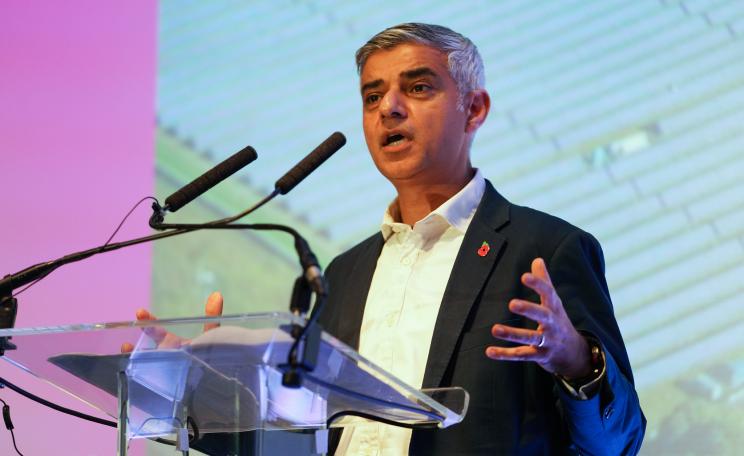People of limited means in a largely working-class city say they have rediscovered transport.
Free public transport “opens the city to all” and should be “provided as a public service, just like health, education and public parks,” a new campaign briefing from Fare Free London argues.
And abolishing fares for public transport in London is “one of the drastic, demonstrative actions needed to tackle climate change globally and air pollution locally”.
READ THE FAIR FREE LONDON BRIEFING NOW
Fare Free London, set up at a meeting of community, trade union and environmentalist activists this year, is calling on the city’s mayor to adopt the policy, and commission research on how to implement.
It urges national government to support the fare-free approach around the country, and change local government finance rules so that it can be paid for.
Social justice
The campaign briefing, supported by Fare Free London, the Greener Jobs Alliance, the Stop the Silvertown Tunnel coalition and Tipping Point, argues that free public transport supports social justice.
Free public transport, introduced as part of an integrated transport policy, would help rapidly to cut the number of private cars, vans and HGVs on the roads – and so cut greenhouse gas emissions, and the air pollution that kills thousands of Londoners each year.
A system based on public transport and active travel (walking, cycling and so on) would supports Londoners’ physical and mental health.
London is falling behind its own weak climate targets, and even further behind targets worked out by climate scientists. The transport sector has made the least progress in cutting fossil fuel use over the last twenty years. Free public transport would start to reverse this dangerous trend.
Free public transport cuts across the dangerous populist rhetoric that tackling climate change costs ordinary people money. It shows that the opposite is true: measures to deal with climate change and air pollution can also make life better.
Accelerated
The briefing cites the largely positive experience of mid-sized cities that have adopted a zero-fares approach, including Luxembourg, Tallinn (Estonia), Dunkerque and Montpellier (France), and Albuquerque and Kansas City (USA). “London can be the first big global city to follow their example.”
London has its own experience to build on: in the 1980s, a sharp reduction in fares bumped up public transport use and reduced car journeys, before Margaret Thatcher’s Conservative government stepped in and took control of the capital’s transport away from the Greater London Council.
On climate policy, the briefing shows that London’s transport sector is missing even the mayor’s own targets – and these lag far behind targets based on climate science.
Mayor Sadiq Khan declared in 2022 that London should aim for “net zero” by 2030, rather than 2050. A report he commissioned from Element Energy on how to achieve this stressed that, in transport, it “can not be achieved by technology alone”. Reducing demand for travel in high-carbon modes – mainly, private cars – is crucial.
People of limited means in a largely working-class city say they have rediscovered transport.
The mayor then opted for an “accelerated green” approach that would cut the number of vehicle-kilometres driven in the city by 27 per cent, by 2030. Even if that is achieved, transport sector emissions would be 30 per cent higher than needed.
Electrification
Fare Free London’s briefing points out that “in the two years since these new targets were announced, City Hall has not noticeably shifted from its emphasis on electrificaiton as the main means to decarbonise transport”.
The briefing points to research from a team at Imperial College, that presents scenarios in which there are 43-81 per cent fewer vehicle kilometres drive by 2027 as the only credible ones for meeting science-based emissions reduction targets.
Electrification of vehicles just can not happen fast enough; cutting traffic is the priority, the Imperial team says. This dovetails with other transport research advocating an avoid-shift-improve approach (avoid car journeys where possible, shift to public transport and active travel, improve the carbon intensity of remaining journeys).
To achieve emissions reductions, free public transport needs to be part of an integrated transport policy, the Fare Free London briefing states.
This includes:
□ Substantial investment in public transport and active travel, a return to principles of public service provision, and support for a properly-rewarded, secure workforce
□ A review of road projects, similar to that undertaken by the Welsh government, with a view to suspending those not compatible with climate policy
□ Policies to encourage active travel (walking, cycling etc)
□ An end to subsidies for car drivers at the public’s expense, and consideration of a London-wide road-user charging scheme, and parking charge reform, to discourage unneeded trips by car
Affordable
“Road pricing is tried and tested”, the report points out. It has been in place in Singapore since 1999, to reduce congestion.
As a social justice measure, to support low-income households, free public transport always works. To achieve progress on climate and air pollution too, it needs to be integrated with other transport policies.
Here Fare Free London builds on the approach advocated by Transport for Quality of Life, whose recent briefing, A Radical Transport Response, stated: Rapid action to reduce car use will only be fair, and command public consent, if it takes place in parallel with big changes to our transport system, to give people decent, clean and affordable ways of travelling to work, education and services, by foot, bike or low-carbon public transport.
A section of the Fare Free London briefing on how to fund free public transport shows that London is more heavily reliant on fare income than other major world cities. The London transport system’s revenue from fares, around £4 billion per year, is 70 per cent of the total (excluding temporary government grants), compared to 26 per cent in Paris, 36 per cent in Hong Kong and 38 per cent in New York.
Alternatives
Alternative options covered by Fare Free London’s briefing include:
□ Road user charging, which can be levied by the mayor, and an improved system of parking fees, which requires cooperation between borough councils
□ Land value capture, already used by Transport for London to finance the recently completed Elizabeth Line, with the Community Infrastructure Levy of £600 million and enhanced business rates income of £4.1 billion. The Centre for Cities estimates that TfL could raise more than ten times as much with similar measures
□ A payroll tax similar to the one in Paris, which covers more than half the cost of the Paris public transport system. A charge of 0.6 per cent of London’s gross wage bill would raise £1 billion per year; it would require parliamentary legislation to introduce.
Clampdown
The report also covers measures that could be adopted by national government, to fund free public transport in London and nationally, including:
□ Ending the freezing and cutting of fuel duty, which has cost the Treasury £80 billion in 2010-23, according to the Office for Budget Responsibility
□ Cancelling road building projects that do not conform to climate policy objectives and diverting the money to public transport
□ A consistent approach to taxing wealth, including a wealth tax, reversal of Capital Gains Tax reductions and the application of National Insurance to the wealth of landlords and speculators
□ A clampdown on corporate tax evasion as long advocated by the Tax Justice Network
Freedom
Fare Free London does not prescribe any means of funding free public transport, but rather points to the wide range of options, given the will to implement it.
Free public transport has “become a synonym of freedom”, the editor of a local transport magazine in Dunkerque, where fares have been abolished, wrote. In a largely working-class city, “people of limited means say they have rediscovered transport.”
Here is a way to voice our aspiration for cities that put people, their health and their lives, first – a way to bring together our struggles for climate justice and social justice.
This Author
Simon Pirani is honorary professor at the University of Durham in the UK, and author of Burning Up: A Global History of Fossil Fuel Consumption (Pluto, 2018). He writes a blog at peoplenature.org. Follow him on Twitter: @SimonPirani1.
Fare Free London’s campaign briefing is downloadable from the Transport Action Network site. Fare Free London can be contacted at info@farefreelondon.org.







